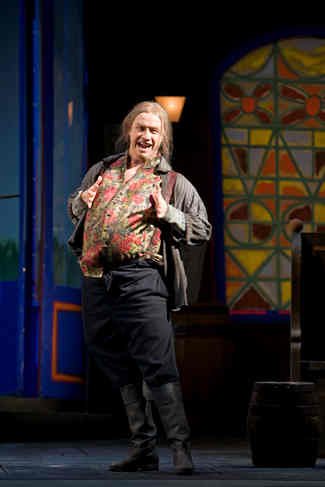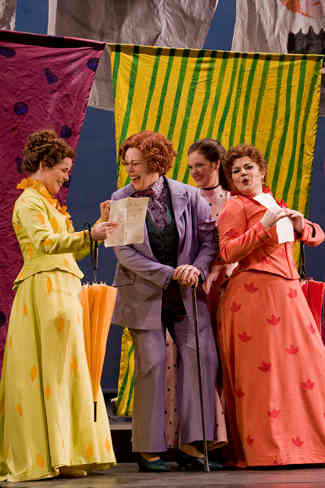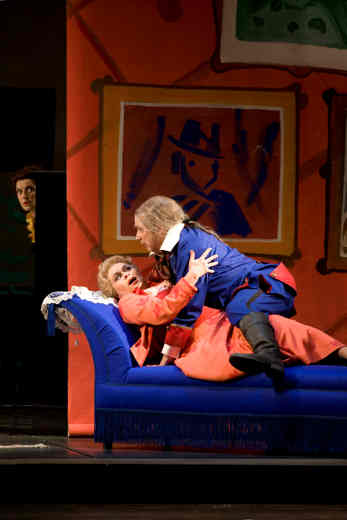Other Links
Editorial Board
- Editor - Bill Kenny
- London Editor-Melanie Eskenazi
- Founder - Len Mullenger
Google Site Search
SEEN
AND HEARD INTERNATIONAL OPERA REVIEW
Verdi, Falstaff :at
the Royal Stockholm Opera (New production) 24.2.2008 (GF)
Falstaff: Carl Johan Falkman
Verdi’s late masterpiece Falstaff hasn’t been too frequent
a guest in Stockholm. I saw the last production more than 30 years
ago and it was old even then, having opened in December 1960.
Since 1987 it hasn’t been seen at all. The new production, signed
Ann-Margret Pettersson, was premiered on 16 February and I saw the
fourth performance, which also happened to be the 100th
ever at the Royal Opera, the first production having opened on 16
November 1896.
As in all buffo opera the comic elements can sometimes turn into
slapstick but by and large this performance stayed within what
could be characterized as good taste. The bullying of Falstaff,
first when he is thrown into the Thames and then in the final
scene in Windsor Park, was remedied by the fact that this Falstaff
was more clear-sighted than most and when all the complications
were sorted out he unmasked, not only the Black Hunter disguise
but also his Falstaff wig, belly and clothes and there he was:
Carl Johan Falkman, fit and trim, in shirt and slacks, showing
that somewhere deep behind our various masks there is a real human
being and only rarely do we get to know that being.
And his wasn’t the only great performance. Bardolph and Pistil,
his constantly half-drunk cronies, were also created with fine
sense for the burlesque and rarely have I heard so sonorous a
Pistol as Lennart Forsén’s. Anders Larsson gets only better and
better for each time I see him and his Ford was sung with
rock-steady voluminous tone and with expression to match, that
should earn him major roles in any of the ‘big’ houses. Klas
Hedlund’s Fenton could hardly be bettered and I wonder if
Stockholm has had a better lyric tenor since the early days of
Claes-Håkan Ahnsjö – and that was more than 35 years ago. Magnus
Kyhle has stepped into the shoes of Sven Erik Vikström, legendary
character tenor for the best part of the post war years.
Directed by Ann-Margret Pettersson
Sets by Lennart Jirlow
Costumes by Ann-Margret Fyregård
Lighting design by Hans-Åke Sjöquist
Cast:
Ford: Anders Larsson
Fenton: Klas Hedlund
Doktor Cajus: Magnus Kyhle / Jon Nilsson
Bardolfus: Ulrik Qvale
Pistol: Lennart Forsén
Mrs Ford: Hillevi Martinpelto
Nanetta: Ofelia Sala
Mrs Quickly: Ingrid Tobiasson
Mrs Page: Katija Dragojevic
The Royal Opera Chorus and Orchestra / Stefan Solyom

Sir John Falstaff - Carl Johan Falkman
Ann-Margret Pettersson has worked at the Royal Opera since 1967
and has a long list of successful productions behind her. I have
very clear memories of many of them and I am sure this one will be
added to that list. Working with the noted artist Lennart Jirlow,
known for his colourful life-enhancing pictures, she has created a
performance that is both burlesque and delicate, thus mirroring
Verdi’s many-faceted music, which is a miracle of inventiveness.
It is possibly his most complicated score and it moves along at
breakneck speed for long stretches, while in between he surpasses
almost anything he had written before in melodic beauty.
Nannetta’s and Fenton’s music is heartrending and Mrs Ford has
been allotted marvellous music where time literally stands still.
Verdi himself was actually present in person on stage during the
first scene at the Garter Inn, where he, having for quite some
time watched Falstaff’s machinations through the revolving doors
at the back, before he slowly entered and positioned himself at
the bar, where he and Falstaff eventually drank to one another.
Jirlow’s inspired and joyful mix of naivist and late 19th
century sets lent a certain fairytale atmosphere to the
proceedings and the costumes, especially the ladies’ exquisite
creations and Falstaff’s quite hilarious outfit when he came to
woo Mrs Ford, contributed to a real feast for the eye.

Katija Dragojevic, Maria Streijffert, Silvia Moi
For Carl Johan – better known as Loa Falkman, this was a
triumphant return to the Royal Opera stage, where he made his
debut as early as 1973 and worked for many years – with some
breaks for other assignments, most notably playing Escamillo in
Peter Brooks legendary Carmen in Paris and elsewhere. From
1990 he has worked as freelance, primarily in non-opera context,
and he has become one of Sweden’s most versatile actors and
entertainers, praised for his participation in numerous movies,
TV-productions, cabarets and musicals. He was, to mention just one
thing, a fantastic Higgins in My Fair Lady a decade ago.
Occasionally he has returned to opera, being a superb Wozzeck at
the Royal Opera some years ago (also on CD) and I saw him as a
tragic and deeply moving Rigoletto in Malmö about six years ago.
Having recently turned sixty he has retained his voice
surprisingly well, allegedly through not singing for many
years, and what little he has lost is more than compensated for by
his superb acting. He is a comic creature of course but most of
all Falstaff is also a tragic person and his big monologues were
masterpieces of expressive singing, chiselled out in the tiniest
details.

Hillevi Martinpelto and Carl Johan Falkman
On the distaff side Hillevi Martinpelto added another Verdi
heroine to her list. Her silvery voice is as yet unscratched by
the ravages of time and as Mrs Ford she revelled in the comic
possibilities of the role, being far from unwilling in the amorous
encounter with the lustily slobbering Falstaff. Ingrid Tobiasson,
in emancipated pantsuit, clearly enjoyed her task as intermediary
for her fellow Missises and the guest singers Katija Dragojevic as
Mrs Page and Ofelia Sala as Nannetta were also good. Mrs Page is
really a secondary role – she has quite a lot to sing in ensembles
but little of solo character – but Nannetta has some of the
loveliest music in the opera and Ms Sala sported a light agreeable
soprano.
Pier Giorgio Morandi conducted the premiere but since then Stefan
Solyom has taken over and he kept the kettle boiling, occasionally
on the verge of being over-heated. On the other hand a plodding
Falstaff is among the most disheartening experiences one can
be exposed to and this performance was truly alive, from the
boisterous introduction to the intricate final fugue – Verdi’s
farewell to his admirers.
The surtitles are in Swedish only and presumably this will be the
state of affairs until a new opera house is built. But that is not
imminent – it has not even been decided where to build.
Pictures © Alexander Kenney and
Onna Heinonen
Back
to Top
Cumulative Index Page
